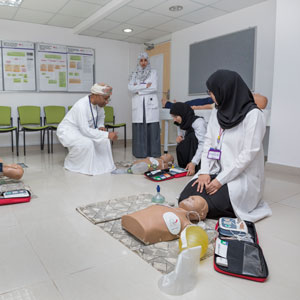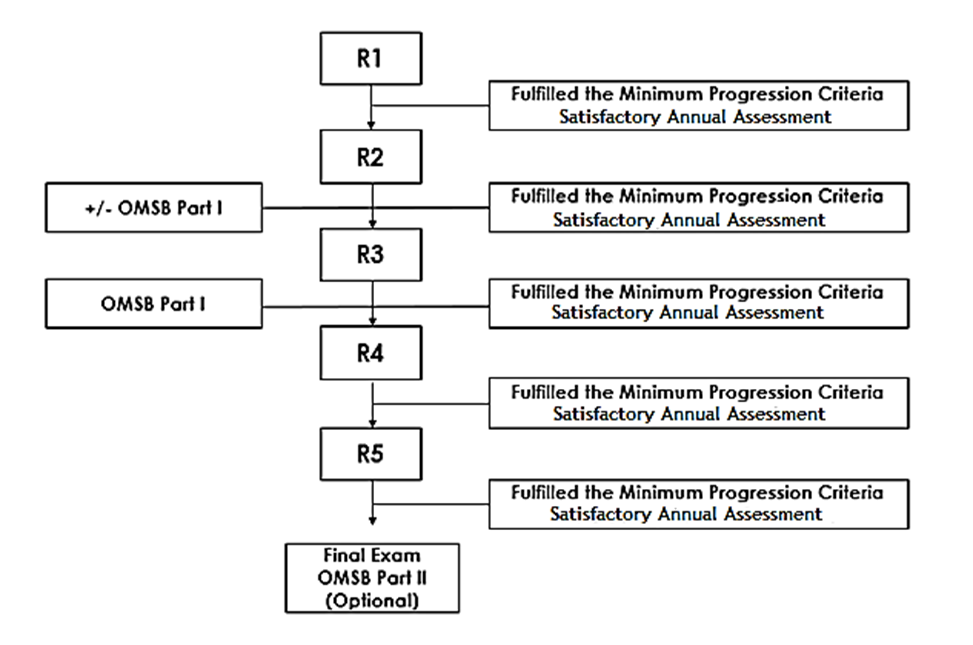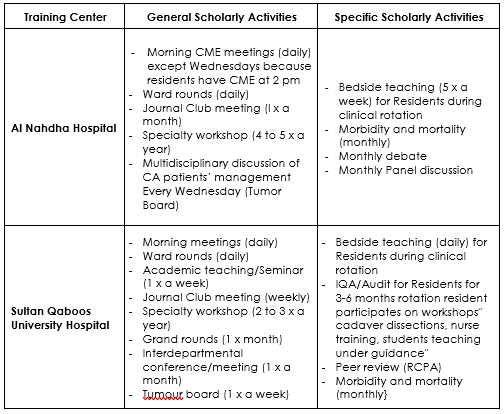
Otolaryngology (ENT)
Introduction:
OHNS residency-training program is a postgraduate training that prepares the trainees intensively to become general Otorhinolaryngologist - Head and Neck Surgeon. The residents should also have the basic knowledge and concepts related to communication disorders. After completion of the training program, residents are expected to be able to provide comprehensive evaluation and management of patients of all ages who have medical and surgical disorders related to Otolaryngology - Head and Neck.
General Goals:
To complete the training with utmost sincerity and commitment and successfully achieve the learning objectives outlined in the curriculum. To provide the optimal services to patients following international standards. To expose the trainees of various National Programs like National Ear Care Program in order to encourage them to contribute to preventive and therapeutic aspects of community service.
We are an autonomous body furthering the growth of human resources for health, through developing specialized physicians and assuring the competencies of healthcare professionals for a healthier and happier community. TheORL- H&N training program aims to mold the residents/trainees into proficient and knowledgeable specialty surgeons.
Leading the advancement of medical professions to ensure excellence in healthcare.
The ORL- H&N training program aims to become the leading training program in the country that cater to the needs in future decades.
Our Core Values:
We care for all
We value relationships
We connect across domains
We nurture individual creativity
Duration of the Residency Training Program: 5 years
Training Centers:
·
Main
Training Centers
1) Al-Nahdha Hospital
2) Sultan Qaboos University Hospital
3) Sohar Hospital
4) Nizwa Hospital
·
Other
Participating Sites:
1) Royal Hospital
2) Khoula Hospital
Rotations Outline:
|
PG-1 Year |
|
|
Rotations |
Duration |
|
General
Surgery |
3 Blocks |
|
Vascular
Surgery |
1 Block |
|
Plastic
Surgery |
1 Block |
|
Anesthesia |
1 Block |
|
Intensive
Care Unit |
1 Block |
|
Emergency
Medicine |
1 Block |
|
Neurosurgery |
1 Block |
|
Selective
ENT Rotation |
2 Blocks |
|
Annual
Leave |
1 Block |
|
PG-2 Year |
|
|
Rotations |
Duration |
|
Audiology
|
1 Block |
|
Research
(Stage 1) |
1 Block |
|
Head
& Neck |
3 Blocks |
|
Rhinology |
3 Blocks |
|
Otology |
3 Blocks |
|
Selective
ENT |
1 Block |
|
Annual
Leave |
1 Block |
|
PG-3 Year |
|
|
Rotations |
Duration |
|
General
ENT |
3 Blocks |
|
Head
& Neck |
3 Blocks |
|
Rhinology |
3 Blocks |
|
Otology |
3 Blocks |
|
Annual
Leave |
1 Block |
|
PG-4 Year |
|
|
Rotations |
Duration |
|
Research
(Stage 2) |
2 Blocks |
|
Audiology
|
1 Block |
|
Head
& Neck |
3 Blocks |
|
Rhinology |
3 Blocks |
|
Otology |
3 Blocks |
|
Annual
Leave |
1 Block |
|
PG-5 Year |
|
|
Rotations |
Duration |
|
Head
& Neck |
4 Blocks |
|
Rhinology |
4 Blocks |
|
Otology |
4 Blocks |
|
Annual
Leave |
1 Block |
Excerpt
from OMSB Residents’ information Manual, 6th Edition (Page 14).
Admission to the Residency Training Program:
Article (14) of Academic Bylaws: Requirements for acceptance in the training
programs of the specialty:
1. The applicant must obtain
a bachelor degree in medicine and surgery or equivalent from an accredited
college or university.
2. The applicant must
complete the internship year successfully.
3. The applicant should be
medically fit.
4. The applicant must pass
the entrance examinations and interviews as well as complete the registration
requirements.
After the approval of OMSB, the Education Committees may add other conditions, oral or
written exams, or tests for admission.
The applicants are selected as per OMSB rules and regulations and
available slots.
General OMSB Evaluation Tools:
In Training Assessment Report
Assessment Form for Presentation
Assessment Form of Procedural Skills
Mini-Clinical Evaluation Exercise Form (Mini-CEX)
Multisource Feedback (360-Degree Assessment Form)
Case-Based Discussion
Journal Club Assessment
Resident Professionalism Assessment
Research Block Assessment
Six Month/Annual Assessment Form
Final In-Training Assessment Form
Other OMSB Evaluation Tools:
Program Evaluation Form
Research Mentor Evaluation Form
Rotation Evaluation Form
Consultant/Trainer Evaluation
Resident Research Progress Evaluation
Program-Specific Evaluation Tools:
Direct Observation of Procedure (DOP)
Direct Observation of Skills (DOS)
ASSESSMENT AND PROGRESSION
The progression of residents will be based on Monthly Assessment (Cumulative) and examination results.
- Progression Criteria Diagram

- For successful completion of the residency program, various other components of residency training will be taken into consideration:
a) Attendance
b) NIS Portfolio
c) Graded achievement of surgical competencies
d) Completion of research project
e) Progress of residents will also be judged according to milestones prescribed by OMSB for various levels of training.
Otolaryngology-Head and Neck Surgery Residency Training Program
CME Academic Teaching
Surgical Foundation Program (SFP) Activities
Attendees: R1
Schedule: Tuesday from 1:30 to 5:00 PM at OMSB Medical Simulation Center
Otolaryngology (ENT) CME Activities
CME Lecture
Skills Lab Lecture
Simulator Training
Journal Club Meeting
Attendees: R1 – R5
Schedule: Wednesday from 1:00 to 3:00 PM at OMSB or Training Center
Aside from the above program’s
regular CME Academic Activities, the below table shows a list of
Scholarly Activities conducted by the ENT Department in the following program
training centers for which residents are to regularly and/or participate as
presenters:

Mandatory Courses:
Program-Specific Mandatory Courses
|
Local Workshop/Courses |
Resident Level |
|
Advanced
Surgical Otology Course |
|
|
§ Lectures |
R2 |
|
§ Lecture + Hands on |
R4 or R5 |
|
FESS
and Rhinoplasty Course |
|
|
§ Lectures |
R2 |
|
§ Lectures + Hands on
|
R4 or R5 |
|
Management
of Challenged Airway Course |
|
|
§ Basic Hands on
Airway Course |
R2 |
|
§ Advanced Hands on
Airway Course |
R4 or R5 |
|
§ Lectures |
R2 |
|
§ Lectures + Live
surgeries |
R4 or R5 |
|
Head
and Neck Course with Hands‐on Cadaver Dissection |
|
|
§ Lectures |
R2 |
|
§ Lectures + Hands on
|
R4 or R5 |
|
Basic
Surgical Skills Course |
R1 |
OMSB Mandatory Workshops (Resident Development Workshops)
|
PGY 1 § Communication Skills
Part I § Medical Ethics § Resident as Teacher
Part I § Infection Prevention
and Control Training § Critical Decision
Making § Professionalism |
PGY
3 § Resident
as Teacher Part II
|
|
PGY 2 § Patient Safety &
Quality Management § Medical
Law § Wellbeing
E-Learning Program |
PGY
4 § Leadership for R4
(Optional) |
Education Committee
Program Director
Dr. Salma Mohammed Hamed
Al Sheibani
Associate
Program Directors
Dr. Faisal Khamis Mubarak Al
Kalbani (ANH)
Dr. Mohammed Khalfan Said Al Washahi (SQUH)
Members
Dr. Laila Musabah Mohammed Abdullah Al Masaoud
Dr. Hamdoon Humaid Said Al
Naamani
Dr. Shaden Zakariya Yahya
Al Riyami
Dr. Yahya Nasser Rashid Al
Badaai
Dr. Mohammed Abdullah
Mubarak Al Rahbi
Chief Resident
Medical Program Executive
Arlyn R. Buraga
Tel: +968 2418 1014
Email: ent@omsb.org
